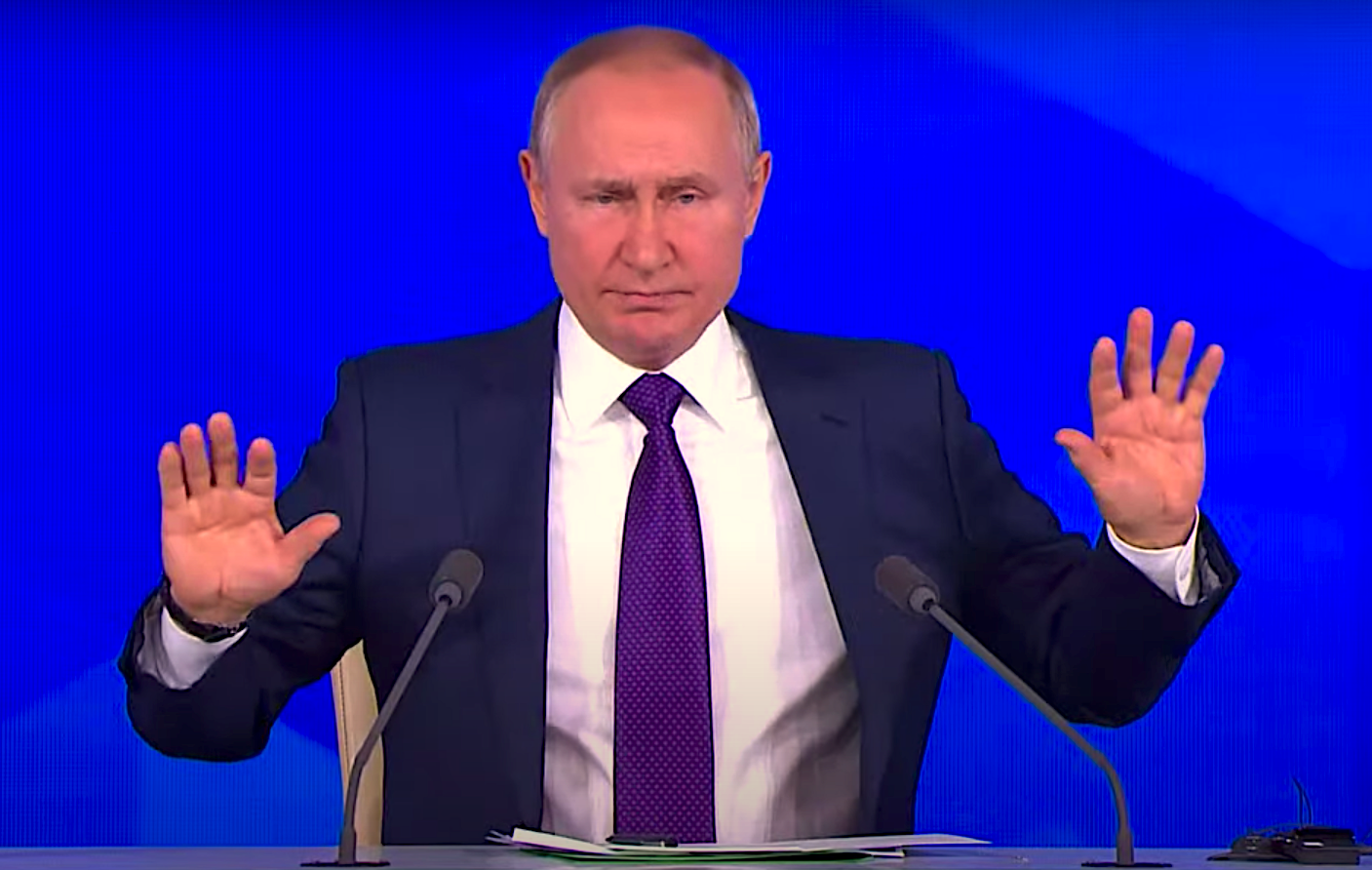Putin told his annual press conference today that the U.S. had “tricked” Russia over NATO expansion and that it had to end, reports Len Bracken.
By Len Bracken
Special to Consortium News
 Russian President Vladimir Putin today told his annual year-end press conference that peace is up to the U.S. after Washington agreed this week to negotiate in January with Moscow on Russian demands to resolve tension over Ukraine.
Russian President Vladimir Putin today told his annual year-end press conference that peace is up to the U.S. after Washington agreed this week to negotiate in January with Moscow on Russian demands to resolve tension over Ukraine.
“Our actions will depend not on the course of negotiations, but on the unconditional guarantees of Russian national security,” Putin said. “We made it clear that NATO’s expansion to the east is unacceptable. The U.S. is on our doorstep with its missiles. How would Americans react if we placed our missiles at the U.S. border with Canada or Mexico?”
Before agreeing to the talks, the U.S. had sent mixed messages about the two formal Russian proposals, characterizing them as either an opening for negotiations or a pretext for war.
The proposals — a draft treaty with the United States and a draft agreement with the North Atlantic Treaty Organization (NATO) — were published by the Russian Foreign Ministry on Dec. 17. The texts reflect Russia’s concern with the eastward expansion of NATO, including the ongoing armament of Ukraine and its proposed eventual inclusion in the Western military alliance.
The Russian proposals were exchanged at a Dec. 15 meeting in Moscow between Russian Deputy Foreign Minister Sergei Ryabkov and Karen Donfried, U.S. assistant secretary of state for European and Eurasian affairs. They contain the following demands:
-
No more NATO expansion towards Russia’s borders. Retraction of the 2008 NATO invitation to Ukraine and Georgia.
-
Legally binding guarantee that no strike systems which could target Moscow will be deployed in countries next to Russia.
-
No NATO or equivalent (UK, U.S., Pl.) ‘exercises’ near Russian borders.
-
NATO ships, planes to keep certain distances from Russian borders.
-
Regular military-to-military talks.
-
No intermediate-range nukes in Europe.
While a senior U.S. senator accused Russia of “clearly trying to create a pretext for war,” the proposals were also viewed in Washington as an opening gambit that could find middle ground.
A day after the Russian demands were made, Sen. James Risch (R-ID), ranking member of the Senate Foreign Relations Committee, called the Russian demands “an insult to diplomacy” and “a list of concessions” that could be used as a pretext for war.
But the White House said it was ready for talks. National Security Adviser Jake Sullivan said the U.S. is “fundamentally prepared for dialogue” with Moscow. “Russia has now put on the table its concerns with American and NATO activities,” he said at the Council on Foreign Relations the day the demands were made. “We’re going to put on the table our concerns with Russian activities that we believe harm our interests and values.”
NATO initially dismissed the Russian move, saying in a Dec. 16 statement that it “supports the right of all countries to decide their own future and foreign policy free from outside interference.” While keeping the door open to working with Russia on “confidence-building measures” in the context of the Organization for Security and Co-operation in Europe (OSCE), the organization said, “NATO’s relationship with Ukraine is a matter only for Ukraine and the 30 NATO Allies.”
In his press conference today, Putin pointed out that the U.S. reneged on a commitment made in 1990 by the George H.W. Bush administration not to expand NATO, a vow supported by documents released in 2017 by the National Security Archive at George Washington University.
“It is not the course of the negotiations that is important, the result is important,” Putin said today. “’Not a single inch to the East’, they told us in the nineties. So what? They tricked us. There have been five waves of NATO expansion. Missile systems are appearing in Romania and Poland. Did we come to them? They came to us.”
Putin told the news conference:
“The Soviet Union did everything to build normal relations with the United States and the West, specialists from American services were present at our military weapons facilities, went there every day. US advisers and CIA personnel worked with the Russian government. What else did they want? Why did they support terrorist organizations in the Caucasus? What for? It was an attempt aimed at the further collapse [of Russia].”
Tensions From 2014
Serious tensions over Ukraine began after a U.S.-backed coup overthrew democratically-elected President Viktor Yanukovych in 2014. As a response, Crimea voted overwhelmingly to join Russia without a shot fired and the eastern provinces in Donbass were attacked by the Ukrainian military and neo-Nazi brigades for resisting the coup.
In his Moscow news conference, Putin said the reunification of Crimea with Russia was not on the agenda before the 2014 coup d’etat.
“The aggravation began in 2014. What happened then? A coup. A bloody one. People were killed and burned”, Putin said. “President Yanukovych agreed with everything, received guarantees from other countries of a peaceful resolution of the situation. How could we refuse Sevastopol and Crimea to take them under our protection?”
In 2014 the U.S. claimed with scant evidence that Russia had invaded eastern Ukraine after the coup. Moscow had sent equipment and provided intelligence and logistical support. Washington and its NATO allies claim that Russia is poised again to invade, though there’s little word on when they withdrew from the first invasion.
Ukraine vows to recapture Crimea amid fears of a Kiev spring offensive. Russia says troop deployments near the Ukraine border are in self-defense. Putin told the press conference his “impression” was an offensive was being prepared. Russia was being warned “not to interfere,” he said, but “we must react.”
Dangerous Shades of 1962
Seen in the light of the 1962 Cuban Missile Crisis, in which both the U.S. and the U.S.S.R. conceded they each had legitimate security concerns with the U.S. removing missiles from Italy and Turkey and the Soviet Union withdrawing its missiles from Cuba, NATO might want to consider negotiating limits to its military activity near Russia’s borders.
George Beebe, former chief of the Russia Analysis Group at the Central Intelligence Agencey, described the proposals as Russia’s “opening position” and as a possible basis for talks. In a comment to Radio Free Europe/Radio Liberty, Beebe, now with the Center for the National Interest in Washington, said he could foresee a potential “middle ground” resulting from talks based on the proposals.
The Russian demands might also been seen in light of European dependence on Russia natural gas supplies, Moscow’s advances in hypersonic missile technology and its reported ability to deactivate enemy electronics with a new weapons system.
Russia could incapacitate NATO forces, according to Xavier Raufer, writing in the October edition of Atlantico, with its Murmansk-BN system that can cut off all satellite waves, cell phones, radios and GPS systems over a 3,000 square kilometer area. “Notably,” he wrote, “the American F35 high-tech fighter jets can be tied to the ground, deprived of their crucial satellite communications.”
Other Moves
While in Moscow on Dec. 15, Donfried, the U.S. assistant secretary of state, reiterated Washington’s concern for Russian troop movements near the Ukrainian border. She also backed the Minsk agreements, signed in 2014 and 2015, concerning the war between Kiev and the breakaway Donetsk People’s Republic and Luhansk People’s Republic in the Donbas region, which Russia says Kiev is violating.
Donfried supported the Normandy Format in which Germany and France have been leading negotiations between the separatists and Ukraine to implement the Minsk agreements: the first being a ceasefire pact and the second involving a political settlement for the separatist republics. Russia considers itself a moderator and not a part of the Normandy Format. Moscow accuses Kiev of not adhering to the Minsk Accords.
Washington, which is not party to the talks, updated the U.S.-Ukraine Charter on Strategic Partnership on Nov. 10.
The Trilateral Contact Group on Ukraine, involving the OSCE, Kyiv and Moscow, has been working toward a peaceful settlement in eastern Ukraine in the context of the Minsk agreements.
The Russian demands come amid renewed fighting between the Ukrainian government and Russian-speaking separatists republics in the Donbas region.
These clashes include the use in October by Kyiv of a Turkish-made attack drone that Moscow has said crossed a red line. NATO member Turkey is set to supply Ukraine with two dozen more attack drones, according to a Dec. 3 report in Bloomberg News.
Russian Foreign Minister Sergei Lavrov said this week that Kiev had also been supplied with Javelin anti-tank missiles by Washington.
Len Bracken is a former international trade reporter for a major news service and the author of numerous books.
Please Support CN’s
Winter Fund Drive
Donate securely with PayPal
Or securely by credit card or check by clicking the red button:





The Saarland was split from Germany by the Treaty of Versailles.
The Nazi govt wanted it back. A referendum was held and 90 percent voted to remain. After WW2 there was again a separate administration. In 1955 there was another referendum and they joined West Germany.
I wonder if an internationally supervised referendum would de escalate. Most of the people are ethnically Russian. The area was transfered, without consultation, to Ukraine in the 1950s.
If it voted to remain Russian, under principles of self determination, it would confirm its status and the EU could drop its sanctions which hurt both sides.
I am sure there would be many objections but it might provide a way out.
The Ukraine is not of any concern of the United States except to cause trouble with Russia and to cover up their demise as an empire and as so-called values, we don’t have any and never did except for the dollar.
Putin’s reasonable & relevant query to the USA goes unanswered: Would the USA allow Russian Federation military installations inside Canada or Mexico…?
The USA remains silent on the question because the obvious and non-negotiable answer would be: “NO…NEVER.”
Yet the USA expects Putin to allow NATO military installations on Russia’s borders, without complaint or resistance.
Putin must be following my commentary in various places. I ask the same damned question: is there a Russian battalion in Ontario?
Can CN provide the link to the 1917 documents described above at the National Security Archive?
“In his press conference today, Putin pointed out that the U.S. reneged on a commitment made in 1990 by the George H.W. Bush administration not to expand NATO, a vow supported by documents released in 2017 by the National Security Archive at George Washington University.”
That would be very useful. Hitherto we’ve been told about an informal agreement.
There is a link to the documents there and has been since the article was published several hours ago.
“Donfried supported for the Normandy Format in which Germany and France have been leading negotiations between Russia and Ukraine to implement the Minsk agreements:”
Russia is NOT party to these “talks” which Kiev has not started.Ukraine needs to talk to the Donbass leaders about a special status for that region. Russia is NOT trying to take over Ukraine or even the two republics -just allow them some autonomy. 7 years of refusal from Kiev which wants someone else to “rescue them from the Russians”, who do not want them and do not want war. No business at all of the USA.